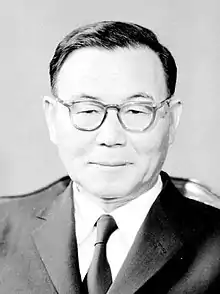Yun Poson
Yun Bo-seon (Korea:윤보선, August 26, 1897 – July 18, 1990) was the President of South Korea from 1960 to 1962.
Yun Poson | |
|---|---|
윤보선 尹潽善 | |
 Official portrait, 1960 | |
| 2nd President of South Korea | |
| In office August 13, 1960 – March 24, 1962 | |
| Prime Minister | Ho Chong Chang Myon Song Yo-chan |
| Preceded by | Rhee Syngman |
| Succeeded by | Park Chung-hee |
| 2nd Mayor of Seoul | |
| In office December 15, 1948 – June 5, 1949 | |
| Preceded by | Kim Hyong-min |
| Succeeded by | Lee Ki-poong |
| Personal details | |
| Born | August 26, 1897 Sinhang-ri, Dunpo-myeon, Asan County, South Chungcheong, Joseon (present day South Korea) |
| Died | July 18, 1990 (aged 92) Anguk-dong, Jongno District, Seoul, South Korea |
| Resting place | Yun Family Cemetery |
| Political party | Democratic (1955) → New Democratic (1967) (Liberalism in South Korea) |
| Spouse(s) | Lady Min (1910s–1937), Gong Deok-gwi (1948–1990) |
| Relations | Uncle: Yun Chi-sung |
| Children | 4 |
| Alma mater | University of Edinburgh (BA, MA) |
| Religion | Christianity |
| Signature |  |
| Korean name | |
| Hangul | |
| Hanja | |
| Revised Romanization | Yun Boseon |
| McCune–Reischauer | Yun Posŏn |
| Pen name | |
| Hangul | |
| Hanja | |
| Revised Romanization | Haewi |
| McCune–Reischauer | Haewi |
| Courtesy name | |
| Hangul | |
| Hanja | |
| Revised Romanization | Gyeongcheon |
| McCune–Reischauer | Kyŏngch'ŏn |
He was born in Asan, South Chungcheong province, Yun graduated from the University of Edinburgh in 1930. He entered politics after Japanese occupation ended in 1945, with Syngman Rhee being his mentor. In 1948, Yun was made mayor of Seoul by Rhee. A year later, he was made the Minister of Commerce and Industry. Soon, he started to disagree with Rhee's authoritarian policies. He then served as president of the Red Cross Society, before being elected to the National Assembly in 1954. A year later, he founded the opposition Democratic Party along with several others.
After Rhee's government was ousted by a student-led pro-democracy uprising, Yun was elected president on August 13, 1960. He was merely a figurehead, as South Korea had switched to a parliamentary system in response to the authoritarian excesses of Rhee's regime. After Park Chung Hee's coup in 1961, he stayed on briefly to provide legitimacy to the regime, but resigned on March 22, 1962. He opposed Park's authoritarian rule and ran for president twice in 1963 and 1967, losing each time. After receiving suspended sentences several times for anti-government activities, Yun retired from politics in 1980 and focused primarily on cultural activities until his death from diabetes and high blood pressure. He died in 1990.
Book
- 《Autobiography, Road of thorns the national salvation (구국의 가시밭길)》(1967)
- 《Select the days of lonely(외로운 선택의 나날들)》(1991)
Prize
- Sharon Big-Merit(무궁화 대훈장)
- In-Cheon Cultural Award[1]
Related pages
- Yun Chi-ho
- Chang Myon
- Jang Jun-Ha
- Yun Chi-Young
References
- ti Prize was the Kim Seong Soo's Memorim
Other websites
- Cheongwadae profile Archived 2006-05-27 at the Wayback Machine
| Preceded by Heo Jeong (Acting) |
President of South Korea 1960–1962 |
Succeeded by Park Chung Hee |
| Preceded by Kim Hyung-min |
Mayor of Seoul 1948 - 1949 |
Succeeded by Li Ki-bung |